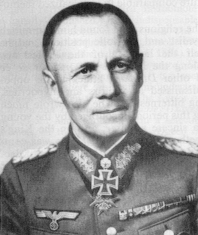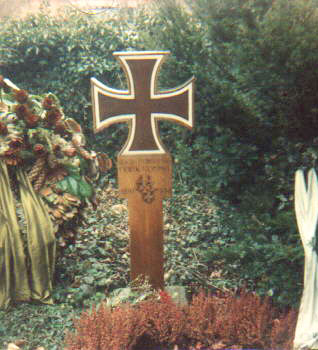Erwin Rommel: German Patriot
![]()

ERWIN ROMMEL, (1891-1944), German general, known as the "Desert Fox for his brilliant military exploits in World War II battles in North Africa.
Erwin Johannes Eugen Rommel was born in Heidenheim, Wurttemberg, on Nov. 15, 1891. He joined the 124th Infantry Regiment as an officer cadet in 1910, and two years later was commissioned a 2d lieutenant. During World War I he served in France and on the Romanian and Italian fronts. After the war he held regimental commands and was instructor at the Dresden Infantry School (1929-1933) and the Potsdam War Academy (1935-1938). His textbook on tactics, Infanterie Greift An, was published in 1937.
In 1938, Colonel Rommel was appointed commandant of the War Academy at Wiener Neustadt. Shortly thereafter he was placed in command of the battalion responsible for Adolf HITLER's safety during the march into the Sudetenland and the entry into Prague. Promoted major general on the eve of World War II, he was again responsible for Hitler's safety during the invasion of Poland.
In 1940 he commanded the 7th Panzer Division in the advance into France. In 1941, with the rank of lieutenant general, he was given command of the German troops in Libya. On June 21, 1942, he was made a field marshal, the youngest in the German Army, in recognition of his success in forcing the British back from Cyrenaica into Egypt as far as El Alamein. However, he was unable to advance to capture Alexandria. In the months that followed, during which he commanded all Italo-German troops in North Africa, he was driven back into Cyrenaica and across Tripolitania into Tunisia, where he encountered fresh Allied forces. After the battle at Medenine on March 5, 1943, he returned to Germany because of ill health.
In July he was given command of Army Group B in northern Italy, and in November he was ordered to report on the coastal defense in the west, from the Skagerrak to the Spanish frontier. He was made commander in chief of all German armies from the Netherlands to the Loire River in January 1944. Despite his great efforts, the Germans were unable to prevent the Allies from landing in Normandy in the following June. On July 17, while Rommel was motoring near Livarot, he was severely wounded by fire from Allied aircraft, and he returned to his home in Germany to convalesce.
Never a member of the Nazi party, he had become increasingly outspoken in his criticism of Hitler's leadership. On Oct. 14, 1944, he was visited by two German generals investigating the cases of officers suspected of complicity in the July 20 plot against Hitler's life. He was given, on orders from Hitler, the choice between taking poison and having his death reported as resulting from his wounds, or facing trial by the People's Court. He elected the former course, ending his life in the generals' automobile near Ulm, Germany, on Oct. 14, 1944.
Hitler ordered national mourning, and Rommel was buried with full military honors. A man of the greatest personal bravery, he earned the deep respect of his adversaries for his brilliant achievements.The Assassination Conspiracy on Hitler's Life
Since 1937, a small group of German officials, military officers, civil servants, and patriots had been planning an attempt to overthrow Hitler and his terror-grip on Germany. However, virtually none of the conspirators controlled any large armies, thus making the possibility of a military coup unavailable. They needed to win a battlefront general who commands a large force with which they can use to put Hitler out of power, for good. However, all of the top brass of the Wehrmacht - Brauchitsch, Halder, von Runstedt, Manstein, Guderian, Kluge - have either refused their support or taken a fence-sitting attitude. However, Rommel has held anti-Nazi views, and is known amongst the conspirators for a rebellious attitude towards Hitler. If they can convince Rommel to join the plot, the coup might definitely succeed. Colonel Claus von Stauffenburg, current leader of the conspiracy, asks General Karl-Heinrich von Stuelpnagel (military governer of Paris and leader of the conspirators in France) to invite Rommel to Paris to discuss the matter of Rommel joining the conspiracy.
Rommel agrees with Stuelpnagel that Hitler had lost touch with reality and seems to have a death wish, and will bring Germany down with him unless something is done. However, he tells Stuelpnagel that assassination is morally unnacceptable for him. He would like to see Hitler arrested and tried in a German court for his many crimes. Rommel sends a teletype memo to Hitler, telling him that the Allies are clearly winning and strongly suggesting that he sue for peace, or cut Germany's losses and withdraw all German troops to inside the German border. He does not believe that Hitler will agree with the message, in which case, Rommel tells Stuelpnagel that he will commit himself to a military coup.
The next day, Rommel's staff car is straffed by British fighters, which kills his driver and sends the car spinning into a ditch. Rommel suffers severe head injuries and is incapable of assisting Stauffenberg when he plants the bomb three days later in Hitler's headquarters. Guenther von Kluge fails to forward Rommel's memo to Hitler, only to send it to him two weeks later. Needless to say, the attempt fails, and Rommel is soon rooted out as a conspirator. There are two stories as to how his name was revealed, the first it that it came through Luftwaffe Caesar von Hofacker under torture, and the second is that after General von Stuelpnagel attempts to commit suicide, fails, he is taken to a German field hospital, where he shouts out Rommel's name in his delirium.
On October 14, 1944, two generals visit Rommel at his home in Errlingen and hand him a cyanide capsule and a message from Hitler: commit suicide and be buried with honors or stand trial for high treason and be hung, which implies the loss of his family's honor. Rommel bids farewell to his wife and son, and is driven off in an army car, having swallowed the capsule. Rommel is buried with full military honors and is bid a hero's farewell.
"His devotion to the profession of arms was in the best tradition of the gentleman. In a total war fought savagely and brutally, he inspired admiration for his treatment of prisoners. He was not tainted by Nazism....With his troops he enjoyed a deep rapport. He cared for them, and although he demanded their best and more, he never squandered them. Without pretension, modest, he tackled all his tasks with clarity, energy, and common sense." -Hitler's Generals, p. 315
Herrlingen Cemetery, Germany.
November 15, 1891 - October 14, 1944

![]()
 Links to other sites on the Web
Links to other sites on the Web
 More Info On The Conspiracy
More Info On The Conspiracy
 Back to the main site.
Back to the main site.